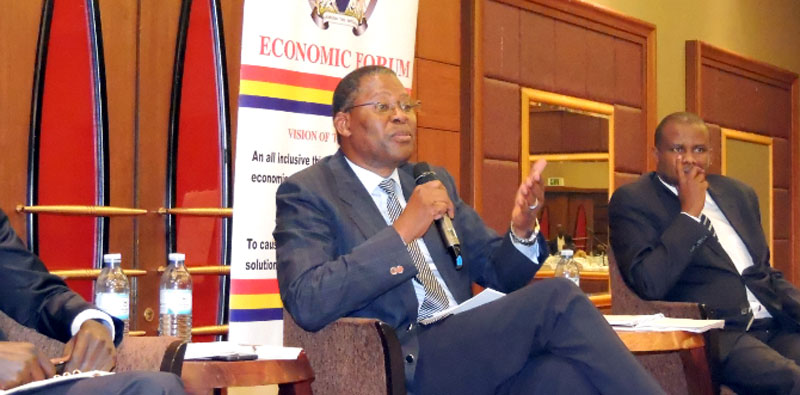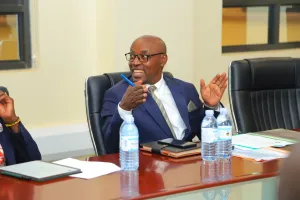

Gideon Badagawa, Executive Director Private Sector Foundation during the MUBS Economic Forum
The planned rationalization of government agencies is facing some challenges that could force the process to be delayed and modified from its original plan.
This emerged from a recent debate that was organised by Makerere University Business School (MUBS)’s Economic Forum in collaboration with Friedrich Ebert Stiftung at Sheraton Hotel Kampala.
Public Service Permanent Secretary Catherine Musingwire Bitarakwate noted that whereas the strategic process had been released, Cabinet is still studying it with the view to developing a clear roadmap for its implementation.
Musingwire’s comments came during a heated debate about the process which many agreed is one of the biggest reforms ever proposed by the NRM government. A number of discussants however, observed that because of the anticipated huge economic cost of the process as well as on the budget and functioning of government, the process needs wider consultations, study and change to achieve the desired impact on service delivery.
During the debate, it emerged that the rationalization exercise had forced some commercial banks to deny salary loans to staff in some of the government agencies for fear of losing money when the borrowers lose jobs. Similar fears were expressed about agencies entering contracts with service providers, which could complicate payments in case the agencies are closed before the contract period expires.
But Musingwire offered some words of comfort to the staff and managers of the agencies saying that: “The fact that government has not concluded on decisions of rationalisation it means the agencies can still enter contracts with service providers,” she added that she has written to all the agencies to guide them on the periods and nature of contracts that they are supposed to enter.
Indicators from some key government agencies such as the National Planning Authority, suggest that implementation of the reforms is not likely at least in the coming financial year because they have not been reflected in the ongoing budget process. The forthcoming 2022 general elections, whose budget was launched this week, is likely to add new dynamism to the reforms, as the country enters a phase that is associated more with populist strategies and less with controversial reforms such as retrenchment.
Musingwire downplayed fears that the rationalisation process would result into massive lay-off of people, stating that affected persons will only be in the administrative roles.
Agencies
As cabinet grapples with reforms, a cross section of stakeholders called for a thorough review of the rationalisation exercise with many suggesting that it needs to go across the entire government system as opposed to a few agencies.
Gideon Badagawa, the Executive Director of the Private Sector Foundation – Uganda (PSFU) said that keeping a bloated government structure with so many Members of Parliament and so many economically unsustainable districts, is the wrong start.
“Are we holding the right end of the stick on agencies when we don’t touch Parliament, districts? We are going to save money [by closing down agencies], but most of it will go into paying allowances in the newly created administrative structures.
He was supported by Dr. Birungi who argued that a lot of reforms have to take place. Dr. Arthur Bainomugisha, from the Agency for Cooperation and Research in Development (ACORD) also called for a holistic rationalisation exercise that will reform the entire government with the view to improving service delivery as opposed to merely cutting costs.
Charles Kateeba, the Managing Director Uganda Railways Corporation argued that government needs to take another look at the agencies to separate productive and administrative agencies.
He called for capitalisation of agencies he described as money making institutions including Uganda Railways Corporation, Uganda Registration Services Bureau (URBS).
Despite the challenges on form, the rationalisation exercise attracted huge support from the audience many of whom said it long overdue.
Ann Babinaga, the Deputy Head of Department on Foreign Direct Investment, strongly advocated for reforms as a way of improving service delivery.
She cited lack of paved roads and poor health services in her home municipality of Kira, despite the existence of nearly 5 agencies responsible for roads, as an example of inefficiency and ineffectiveness of the current government agencies.













Henry Lutaaya
Leave a Comment
Your email address will not be published.